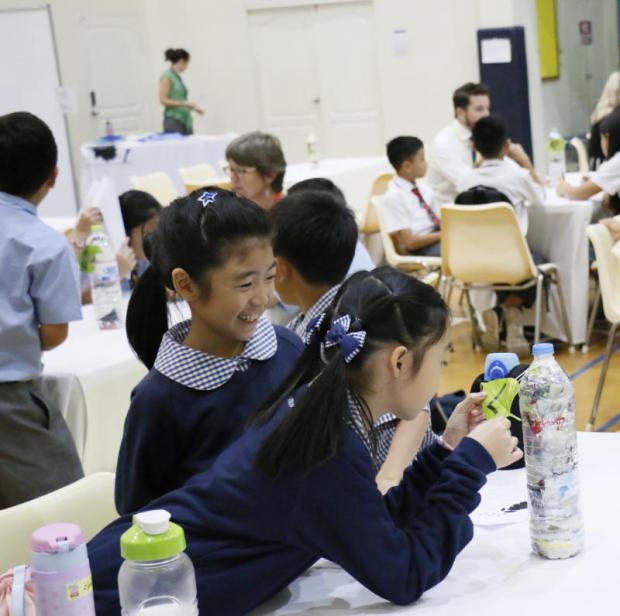
Environmental issues are challenging leaders and governments across the world. There are many threats to tackle, from climate change to plastic pollution. While countries such as Kenya and France have banned single-use plastic bags, others have started to tax their use. However, the Thai government continues to drag its feet, leading action groups and individuals to devise their own creative ways to tackle environmental issues.
One example is the group "EcoBEASTs", which was created by teachers at international schools in Bangkok. It hopes to connect youngsters with grassroots groups and green businesses and embed the concept of sustainability firmly into the minds of young people.
The group launched itself with a "Community Action Day" event hosted early last month by St Andrews International School on Sukhumvit 71. The event welcomed 120 students aged between 7 to 11 from across 17 international schools in Bangkok.

clean living: Students learn how to turn used cooking oil into soap.
Teachers from three schools have collaborated to form EcoBEASTs -- Helen Mullen, a primary school teacher at St Andrews and Katy Waring, a primary school teacher at Shrewsbury City School are spearheading the initiative. Glyn Hupalo from Amnuay Silpa designed the group's website which seeks to connect schools and sustainability groups for the long-term.
"We believe that educating the children of today will help solve the problems of tomorrow. We hope to honestly highlight what's happening to our planet and introduce children to them so that they can tackle these problems," said Ms Mullen.
"Educators must make young people aware about sustainability as it's now a significant part of the culture students are growing up in. Moreover, children are increasingly interested in it," said Paul Scholfield, the head teacher of St Andrews International School. "If schools don't get this right, where will we be in 15 or 20 years time?" he asked.
Attending the event also was a student-run initiative -- "Grin Green International" -- which focuses on single-use plastic pollution. The group has hubs in Berkeley International School and Bangkok Christian International School.
"We are promoting cultural change in Thailand. We believe that in order to ban single-use plastics, we must change the mindset of the people, and this must be done through campaigns and events," said Thiti Usanakul, 17, one of the core leaders of the project.
Last year, Grin Green International students created the group's mascot: a "plastic bag monster". The wearable suit is made of 700 plastic bags, equivalent to the number of plastic bags a resident of Bangkok uses in three months.
"Along with signs, posters and a petition to present to the government, we toured around Bangkok for 13 hours," said Donggeon Yun, Grin Green International's 18-year-old director. A video created about their efforts has been viewed 31,735 times on Facebook.
Wearing the costume on its initial outing was Geoff Baker, a social studies teacher at Berkeley International School and founder of Grin Green International.
"As teachers, we should set an example. I wanted to show students not to be afraid of doing something embarrassing and as a result, they have worn it themselves at all events since," said Mr Baker.
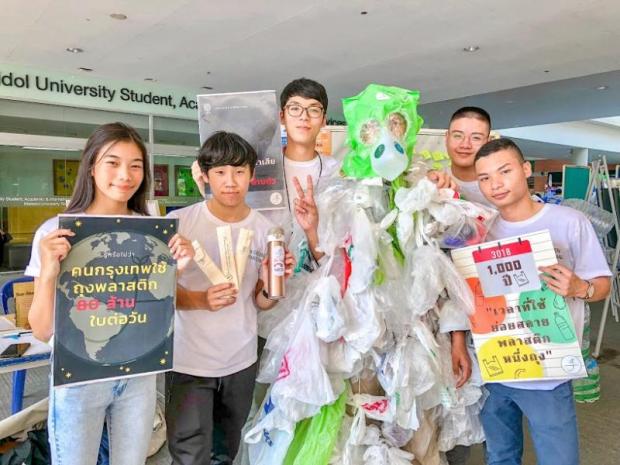
Mascot for the times: Students with their plastic bag monster. The suit is made of 700 plastic bags, equivalent to the number of plastic bags a Bangkok resident uses in three months.
However, Mr Baker incorporates more than just learning about environmentalism in his students' activities. By acting on the matter, "I feel they are gaining experience of the real world and developing a professional mindset," he said.
But it is not just older students acting as environmental guardians. Working separately from Grin Green International is 11-year-old Lilly Smittipatana who has been concerned with plastic pollution since she was eight.
Motivated by her shock of seeing a litter strewn on a beach, Lilly has met a range of retail business leaders to explain her worries about the harmful effects of plastic bags on the environment.
Following Lilly's initiatives, Tesco Lotus, Big C, 7-Eleven and Central Group have signed a memorandum of understanding with the Ministry of Natural Resources and the Environment, pledging not to hand out plastic bags on the fourth day of every month.
HANDS-ON LEARNING
Another key part of the event involved workshops run by 15 environmental organisations, covering subjects ranging from air pollution, wildlife and soil conservation, and how to create soap by recycling used cooking oil.
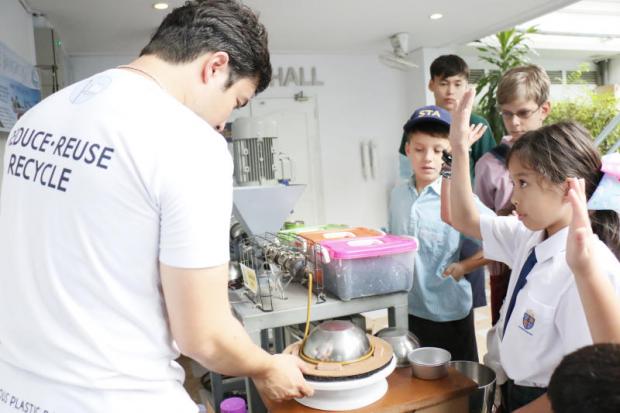
Waste not, want not: Precious Plastic Bangkok's machine recycles old plastic into something new.
One workshop, ran by the group "Precious Plastic Bangkok" showcased a fully functioning plastic recycling machine, which fascinated the students. The machine can shred, melt and eventually turn a pile of plastic bottle caps into a brand new bowl.
"Precious Plastic Bangkok provide a community-based recycling solution. Our machines, designed in the Netherlands, are simple to construct and the blueprints are available for free on our website. Any community can build a machine and tackle plastic pollution," said Precious Plastic Bangkok director, Dominic Chakrabongse.
"I want to inspire children to see plastic in a different light. Plastic can be collected and turned into something useful -- depending on the mould used. I hope to see our machine in school design and technology workshops, allowing students to use their imaginations to create their own moulds," Mr Chakrabongse said.
The youngsters suggested making toy turtles and whales to illustrate the problem of plastics in our oceans.
CONNECTING WITH BUSINESS
Socially responsible businesses also attended the EcoBEAST event. Among them was "Bambew", which produces bamboo straws in an economically disadvantaged part of rural Vietnam. The straws are then exported around the world. Each child received their own specially branded EcoBEASTs bamboo straw at the event.

Coming together: The 2019 EcoBEASTs Community Action Day was hosted at St Andrews International School on Sukhumvit 71. The event welcomed 120 students aged 7 to 11 from 17 international schools from across the capital.
After the workshops, students were asked to write action plans detailing what they could do to help and the room buzzed with ideas. For instance, Mneme, Shana, Sophie and Rio -- a group of grade 6 pupils from St Andrews International School -- explained their idea to open a company called "Eco-struction", which would turn old clothes into shopping bags.
But the eco-bags are just a starter. Looking ahead, the girls have a grand business plan. "We will sell these cloth bags and use the money to buy a 'Precious Plastic' machine to make bowls out of bottle caps. We can sell the bowls too," said 11-year-old, Mneme, 'but the eco-bags will also help reduce the use of plastic bags at the same time," she added.
The girls' scheme shows a clear understanding of what the day was about. It is now the work of the teachers and adults in their lives to guide them towards making their ambitious plans a reality. Ultimately, creating real change-makers in the future.
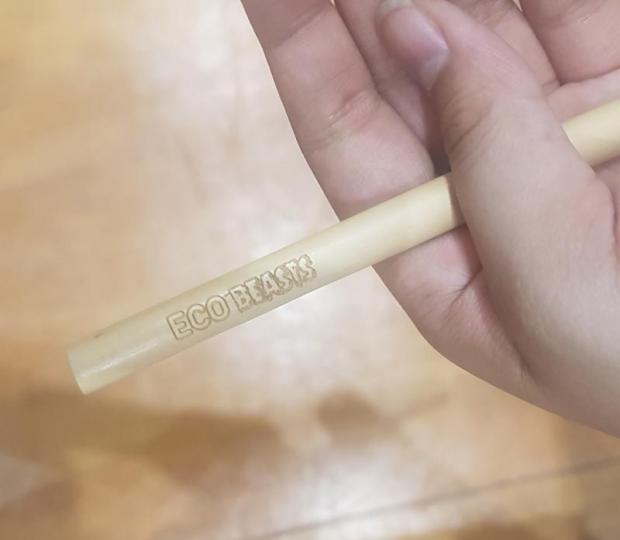
"Bambew," is made from bamboo straws. Each child attending the event received one's own specially branded EcoBEASTs bamboo straw.
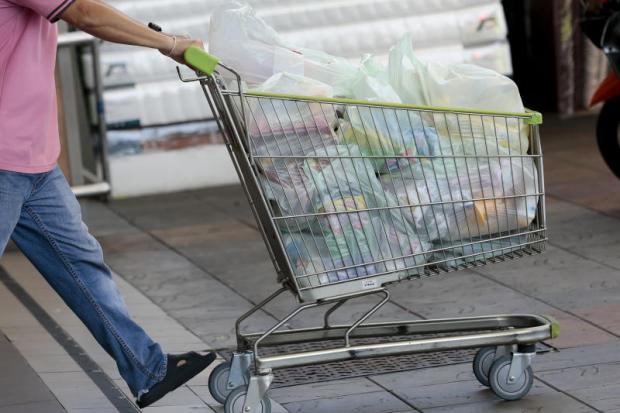

bags of trouble: On average, Thais use eight bags each per day; almost 200 billion bags per year.
THAIS ADDICTED TO BAGS, PLASTIC
Thailand now ranks in the top 10 producers of marine waste in the world, with 1.3 million tonnes a year. China holds the top spot (8.82 million tonnes) followed by Indonesia (3.22 million tonnes) and the Philippines (1.88 million tonnes).
The growth of the plastic industry has fed into the country's growing domestic consumption and plastic usage has grown by 12% annually.
On average, Thais use eight bags each per day, which equates to almost 200 billion bags per year.
Ewen Mcleish is a Bangkok-based educator and writer with an MSc in Education for Sustainability. The EcoBEASTs web address is https://ecobeastsbkk.com